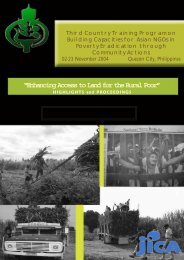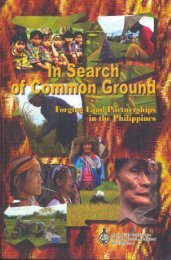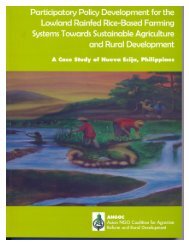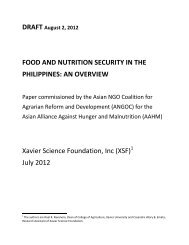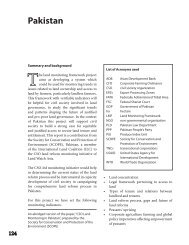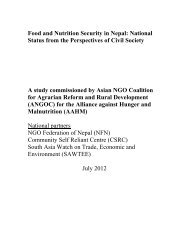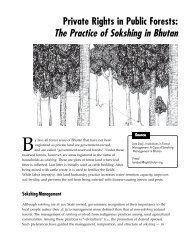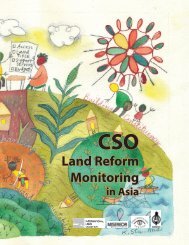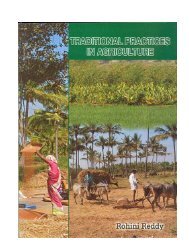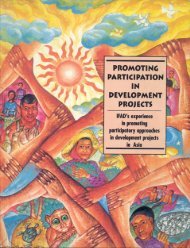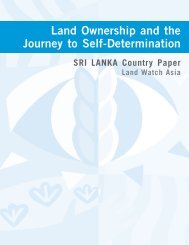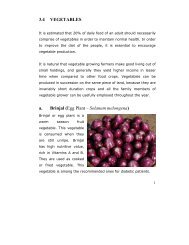Securing the Right to Land FULL - ANGOC
Securing the Right to Land FULL - ANGOC
Securing the Right to Land FULL - ANGOC
You also want an ePaper? Increase the reach of your titles
YUMPU automatically turns print PDFs into web optimized ePapers that Google loves.
SECURING THE RIGHT TO LAND<br />
62<br />
implemented land registration, and administered land transactions.<br />
The <strong>Land</strong> Law of 1992 was also amended in 2001 <strong>to</strong> address<br />
more directly <strong>the</strong> same regula<strong>to</strong>ry concerns. Yet <strong>the</strong> NGO<br />
sec<strong>to</strong>r in Cambodia is one in <strong>the</strong> opinion that <strong>the</strong> law has not<br />
been properly implemented. 1<br />
According <strong>to</strong> <strong>the</strong> NGO Forum of Cambodia, “The inadequate enforcement<br />
of laws and executive regulations in relation <strong>to</strong> <strong>the</strong><br />
management of land and natural resources results in <strong>the</strong> spoliation<br />
of <strong>the</strong> natural and cultural heritage of Cambodian citizens,<br />
especially vulnerable groups living in remote areas, through <strong>the</strong><br />
use of different practices, such as misinformation, intimidation,<br />
threats, land grabbing, illegal logging and illegal land sales.” 2<br />
NGO and donor representatives view this as part of bigger problems<br />
related <strong>to</strong> poor governance, such as shrinking democratic<br />
space, lack of rule of law and legal impunity, lack of transparency<br />
and competence, and corruption 3 . The institutions responsible<br />
for equitable land administration and conflict resolution<br />
also face <strong>the</strong>se problems, in addition <strong>to</strong> being overly bureaucratic.<br />
As a result, even if cases of land disputes proceed <strong>to</strong> <strong>the</strong><br />
courts, <strong>the</strong> complainants frequently lose 4 . In o<strong>the</strong>r words, <strong>the</strong><br />
increasing problem of landlessness is not given sufficient recognition<br />
by responsible government agencies.<br />
CASE STUDY #1<br />
The Killings in Kbal Spean<br />
On 21 March 2005, a mass eviction <strong>to</strong>ok<br />
place in Kbal Spean, a village in Poipet<br />
commune, O’Chrov district, Banteay<br />
Meanchey province. In <strong>the</strong> ensuing scuffle,<br />
5 villagers were killed and at least 40 o<strong>the</strong>rs<br />
were injured. Three members of <strong>the</strong> military<br />
and police forces were arrested, but were later<br />
released without charge.<br />
The eviction incident <strong>to</strong>ok place at <strong>the</strong><br />
height of a land dispute between <strong>the</strong> community<br />
and <strong>the</strong> official village chief, Tin Oun,<br />
who is claiming <strong>the</strong> land for himself.<br />
According <strong>to</strong> <strong>the</strong> villagers, <strong>the</strong> district authority<br />
had awarded <strong>the</strong> land <strong>to</strong> <strong>the</strong>m in 1997.<br />
Yet, a year later, Tin Oun applied for ownership<br />
of <strong>the</strong> same land and received a title <strong>to</strong> it.<br />
The evictees moved <strong>to</strong> ano<strong>the</strong>r area, but<br />
soon after returned <strong>to</strong> Kbal Spean <strong>to</strong> face an<br />
uncertain fate. Nobody was charged for what<br />
<strong>the</strong> villagers regard as an illegal eviction, nor<br />
for <strong>the</strong> deaths of <strong>the</strong> 5 villagers. No land titles<br />
have been distributed <strong>to</strong> <strong>the</strong> villagers.<br />
Representatives of <strong>the</strong> Kbal Spean community<br />
came <strong>to</strong> Phnom Penh and camped for<br />
nearly four weeks in front of <strong>the</strong> National<br />
Assembly Building. They <strong>the</strong>n sent a letter<br />
<strong>to</strong> <strong>the</strong> Council of Ministers <strong>to</strong> request a quick<br />
and peaceful solution <strong>to</strong> <strong>the</strong> land conflict <strong>the</strong>y<br />
were embroiled in. On 21 December 2005,<br />
<strong>the</strong> community received a reply from <strong>the</strong><br />
Council of Ministers, informing <strong>the</strong>m that <strong>the</strong>ir<br />
case was under <strong>the</strong> jurisdiction of <strong>the</strong> provincial<br />
authority, <strong>the</strong> Governor of Banteay<br />
Meanchey Province. Upon receiving this information,<br />
<strong>the</strong> community representatives<br />
returned <strong>to</strong> Kbal Spean.<br />
Moreover, <strong>the</strong> traditional power structure that characterizes<br />
Cambodian society—which is based on concepts such as deference<br />
<strong>to</strong> authority and patron-client relationships—constitutes<br />
ano<strong>the</strong>r effective deterrent <strong>to</strong> people’s attempts <strong>to</strong> demand <strong>the</strong>ir<br />
right <strong>to</strong> land. “Deference <strong>to</strong> authority” prevents a person from<br />
standing up <strong>to</strong> his/her superiors; doing so is considered not only<br />
unacceptable, but foolish, as <strong>the</strong> complainant is bound <strong>to</strong> lose<br />
his/her case.<br />
“Patron-client relationships” have <strong>the</strong>ir origins in <strong>the</strong> Cambodian<br />
tradition of absolute rule. In <strong>the</strong> absence of public law, relationships<br />
are based on <strong>the</strong> patron’s role of offering physical<br />
protection and financial assistance and, conversely, on <strong>the</strong><br />
client’s obligation <strong>to</strong> show loyalty and occasionally, render service,<br />
<strong>to</strong> his patron. The continuance of this traditional power<br />
structure is thought <strong>to</strong> be one of <strong>the</strong> reasons for <strong>the</strong> ineffectiveness<br />
of land dispute resolution mechanisms. The “patronclient<br />
relationship” is based on <strong>the</strong> assumption that <strong>the</strong> patron<br />
would always act benevolently <strong>to</strong>ward <strong>the</strong> client, for fear of losing<br />
power, influence, and authority. However, this assumption is<br />
true only if <strong>the</strong> client is able <strong>to</strong> exert sufficient influence on <strong>the</strong><br />
patron. Observers have noted that majority of <strong>the</strong> Cambodian<br />
population are unable <strong>to</strong> exert enough pressure <strong>to</strong> force a resolution<br />
of land disputes.<br />
In May 2006, <strong>the</strong> conflict was resolved<br />
following <strong>the</strong> Prime Minister’s intervention.<br />
Provincial authorities negotiated a settlement<br />
between <strong>the</strong> 218 families living on <strong>the</strong> land<br />
and <strong>the</strong>ir village chief. The settlement permitted<br />
<strong>the</strong> families, who had previously held<br />
10-meter by 20-meter plots of land, <strong>to</strong> retain<br />
slightly smaller plots, and awarded <strong>the</strong><br />
rest of <strong>the</strong> land <strong>to</strong> <strong>the</strong> village chief.<br />
Until now, Human <strong>Right</strong>s Organizations<br />
are urging <strong>the</strong> government <strong>to</strong> continue its<br />
investigation of <strong>the</strong> eviction and <strong>the</strong> killing<br />
of <strong>the</strong> five villagers of Kbal Spean. They argue<br />
that <strong>the</strong> resolution of <strong>the</strong> land dispute<br />
does not expunge <strong>the</strong> culpability of <strong>the</strong> murderers<br />
nor <strong>the</strong> victims’ right <strong>to</strong> justice.



